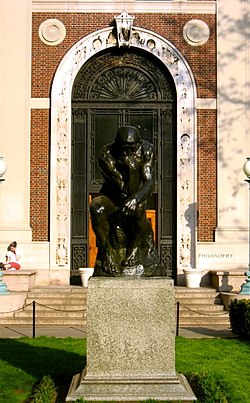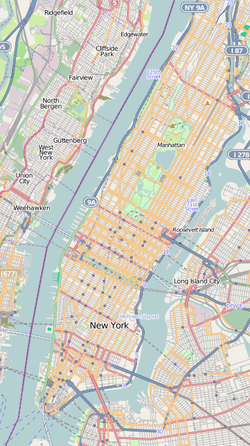Philosophy Hall
|
Philosophy Hall
|
|

Rodin's The Thinker with Philosophy Hall in the background
|
|
| Location | 1150 Amsterdam Avenue, Columbia University |
|---|---|
| Nearest city | New York City |
| Coordinates | 40°48′22″N 73°57′45″W / 40.80611°N 73.96250°WCoordinates: 40°48′22″N 73°57′45″W / 40.80611°N 73.96250°W |
| Built | 1910 |
| Architect | McKim, Mead and White |
| Architectural style | Italian Renaissance Revival |
| NRHP Reference # | 03001046 |
| Significant dates | |
| Added to NRHP | July 31, 2003 |
| Designated NHL | July 31, 2003 |
Philosophy Hall is a building on the campus of Columbia University in New York City. It houses the English, Philosophy, and French departments, along with the university's writing center, part of its registrar's office, and the student lounge of its Graduate School of Arts and Sciences. It is one of the original buildings designed for the university's Morningside Heights campus by McKim, Mead, and White, built in the Italian Renaissance Revival style and completed in 1910. Philosophy Hall is listed on the National Register of Historic Places and has been designated a National Historic Landmark as the site of the invention of FM radio by Edwin Armstrong in the early 1930s.
The space now occupied by the registrar formerly housed electrical engineering laboratories in which Michael I. Pupin and Edwin Howard Armstrong made several major technological breakthroughs. The building has been home to such notable faculty members as philosophers John Dewey, Frederick J. E. Woodbridge and Ernest Nagel, Guadeloupean novelist Maryse Condé, French literary scholar Michael Riffaterre, poet Kenneth Koch and English literary scholars Lionel Trilling, Edward Said, Carolyn Heilbrun, Quentin Anderson, Gayatri Chakravorty Spivak and Mark Van Doren.
...
Wikipedia



